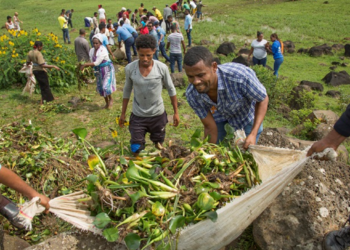Breaking Barries and Paving the Way for Gender Equality:Investing In Women in the Blue Economy in Kenya (IIW-BEK) – The Kenyan coast has rich natural resources that include mangrove forests, coral reefs, terrestrial thickets, sandy beaches and seagrass beds. These generate high biodiversity and productive waters which in turn support economies and livelihoods.
By working closely with coastal communities, the government and investors have prioritized enhancing the well-being of coastal communities in terms of economic opportunities, social protection, ensuring resilience in the face of natural disasters and the impact of climate change, and reducing the risks of overexploitation and hazardous methods of using ocean sources. Kenya prioritizes the sustainable use of ocean resources and the blue economy as an enabler of their Vision 2030. Kenya is an emerging economic front, and the blue economy is expected to contribute to increase economic development through food and nutrition security, coastal and Rural Development, Income revenues along Water value chains, maritime transport and tourism.
The bright side of the blue economy to support women in Kenya.
The investment in women in the Blue Economy program has been launched in Kenya (IIW-BEK). This program aims to address the challenges faced by women running small businesses in the blue economy, which include financial constraints and methodological challenges. This five-year program is funded by Global Affairs Canada and implemented by the African Enterprise Challenge Fund.
The IIW-BEK program aims to encourage the empowerment of women in Kenya’s blue economy, providing job opportunities, training and appropriate financing for women working in this sector. The program includes the allocation of 2,500 exclusive jobs to women, and is expected to generate 50,000 indirect jobs in the blue economy sector. The program is designed to improve the lives of women in the Lake Victoria basin and coastal areas, enabling them to participate in many value chain additions in sectors such as tourism, biodiversity conservation, and mangrove restoration.
The IIW-BEK program goes beyond just funding, as it focuses on addressing the harmful gender norms that have hindered women’s progress in the sector. The program follows a sustainable fishing gear-like approach, focusing on marine protection, green energy production, and greenhouse gas reduction to create transformative livelihood opportunities.
By recognizing the significant contribution of women in this sector, the IIW-BEK program aims to harness the enormous resources of Kenya’s blue economy, providing opportunities for women to actively participate and thrive. This program can significantly affect investment in Kenya’s blue economy and is an important step towards achieving gender equality and sustainable development in the country.
Programme Objectives
Support evidence-based programme interventions that support women’s economic participation in the non-traditional sectors of the blue economy.
Enhance private sector engagement of women as economic actors in the blue economy sector.
Increase private and public sector investment in women and young women-owned Micro, Small, and Medium Enterprises (MSMEs).
Window 1 – Women in the Blue Economy Enterprise (WBEE) Window: Objectives
Enhance financial inclusivity for the women and young women medium-sized enterprises operating within the blue economy sector increasing access to credit, enabling market linkages, supply of inputs, products, services along the value chain and creating employment.
Provide targeted enterprise development technical assistance and capacity building on gender mainstreaming for enterprises.
Advocate and increase awareness of the business case for investing in women in the blue economy in Kenya.
Provide incentives for sustainable widespread adoption of climate-smart practices in Kenya’s blue economy.
Focus Sectors
- Fisheries;
- Agriculture/Forestry;
- Productive use of renewable energy;
- Waste management;
- Biodiversity protection (marine and lake biodiversity);
- Tourism-provision of products and services to the tourism sector;
- Supply of inputs and services(e.g., access to finance, climate-smart technologies – aquatic blue food storage and transportation, market information etc).
Social enterprises that reduce the burden of care for women and young women (e.g., daycare child services).
The blue economy in Kenya is an important part of the sustainable development of the country, effectively exploiting the water potential to create jobs and improve the standard of living of the population.
Breaking Barries and Paving the Way for Gender Equality:Investing In Women in the Blue Economy in Kenya (IIW-BEK)









